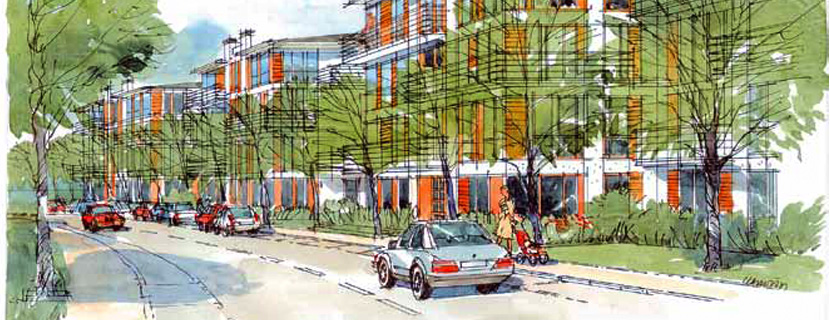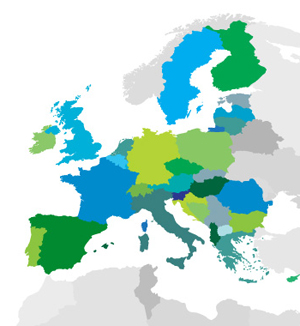
ESPRO : The European Forum for Sustainable Property Development
ESPRO is a dynamic, interactive, Forum where Europe's leading property Stakeholders, both public and private, can on a common platform meet and act upon issues related to the creation of a sustainable property sector in Europe. These Stakeholders include legislators, property investors, corporate investors, tenant organisations, planning authorities, consultants and contractors.
 ESPRO's Mission is based on the premise that Planet Earth cannot sustain life without the attainment of a Sustainable Society. Due to the dominant role which the property sector plays in the consumption of natural resources and the generation of waste and pollution, a Sustainable Society cannot be achieved without the creation of a Sustainable Property Sector.
ESPRO's Mission is based on the premise that Planet Earth cannot sustain life without the attainment of a Sustainable Society. Due to the dominant role which the property sector plays in the consumption of natural resources and the generation of waste and pollution, a Sustainable Society cannot be achieved without the creation of a Sustainable Property Sector.
ESPRO is the result of programmes of research, development and international networking performed by The Windborne International Group and financed by a variety of Swedish Governmental Agencies (under either The Ministry for the Environment and/or The Ministry for Industry) and UK and Swedish property sector Stakeholders.
The Windborne International Group ‘s Chairman, Robert Windborne-Brown, is Chairman of ESPRO.
The primary Founder Member financiers are The Swedish Energy Agency (SEA) and The Royal Institution of Chartered Surveyors (RICS) in the UK.
The Programme has, amongst other activities, involved the preparation of three reports entitled " The Conversion to Sustainable Property Development in Europe "
( 1 – 3 ). A number of conferences have also been held where leading European property sector stakeholders have actively participated both as Speakers and delegates.
These include an International Conference held at the Swedish Governments Headquarters entitled: "Sustainable Building in Europe: Cost – Benefits – Value", The London Conference at The Royal Institution of Chartered Surveyors, entitled "The Move towards Sustainable Property Development in Europe"and The Barcelona Conference entitled “The Move towards the Combustion-free Energising of Buildings”.
ESPRO is the primary public – private sector Forum operating as a Driver of Change in the move towards the development of a sustainable European property sector.
ESPRO is focussing its efforts upon several areas of sustainable development ranging from the macro level (city planning, urban transport systems, regional energy systems) to the micro level (building design and construction, local energy systems). Activities include the establishment of sustainable policies and strategies, the arrangement of interactive events and the initiation and development of Pilot Projects.ESPRO 's organisation today comprises
- The Management Group. Manned by members of The Windborne International Group
- The Steering Committee today comprises representatives from SEA and the RICS. The Steering Committee will be successively expanded to include representatives from all EU member countries.
- The Reference Group (RG) which is responsible for providing advice and / or resources and / or initiatives. The RG currently comprises the following organisations and will be expanded during the next two years to embrace representatives from all EU member countries:
- The European Commission
- The Swedish Energy Agency
- The Royal Institution of Chartered Surveyors
- Swedish Ministry of Sustainable Development
- British Property Federation
- The Swedish National Board of Housing, Building and Planning ( Boverket )
- SAM Group / Dow Jones Sustainability Index
- Construction Industry Council ( UK )
- Royal Institute of British Architects
- Property Environment Group ( UK )
- Swedish Forum for Construction Clients (Byggherreföreningen)
- Swedish Building Sector's Innovation Centre (BIC)
- Sheppard Robson Architects
- Skanska
- Lunds Technical University
- Luleå Technical University
- GE Real Estate
Sustainable Property Development in Europe
Generally
The Building and Property sectors are the single most significant players in the drive towards a Sustainable Society. Over 50% of the material and energy flows in Society are accounted for by the Building and Property sectors.
Research shows that these sectors also generate a significant environmental impact in the form of hazardous waste, air pollution and the depletion of natural resources
During the next decade, the European construction and property sectors will increasingly witness two major structural changes:
- The European market will transform from being a foreign to becoming a domestic market for European companies.
- The increasing conversion from traditional to European-wide sustainable building methods, 'life-cycle' management systems and sustainability-oriented planning processes.
Together, these events represent the most important and dramatic changes for these otherwise conservative sectors for over a century. The implications of this development will stretch from the micro level (the planning, design, construction and operation of individual buildings) to the macro level ( the more sustainable usage of land, the more efficient utilisation of collective transport systems, the broader deployment of sustainable energy systems etc).
Even the relative market values of sustainable and non-sustainable properties will be of increasing significance as tenants seek to align their individual values and/or sustainable corporate policies with the buildings which they occupy.
This situation represents both a challenge and an opportunity for companies. What is clear, is that to survive, develop and protect the interests of their shareholders, companies must adapt to this changing situation by developing a European Sustainability Strategy founded upon sustainable building, sustainable property development and the implementation of a sound Ownership Policy.
ESPRO has been invited to many international conferences. An example of this is the European Commission conference on ECO Innovation in Brussels
Read article in EPRA Magazine - European Public Real Estate Association >
